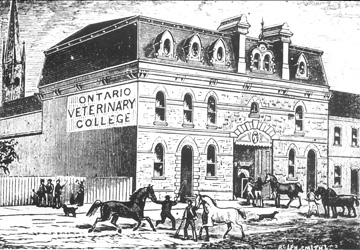The year was 1862. The major event in the news, at least on this side of the Atlantic, was the American Civil War. South of the border, it continued to rage. Several major battles were fought and in September, President Abraham Lincoln announced the preliminary Emancipation Proclamation. In British Columbia, a smallpox epidemic ravaged the First Nations people. Ultimately, it would wipe out about one-third of the native population. The rest of British North America was becoming very concerned that eventually the United States would again try to take over all of North America. These worries were primarily responsible for the act that led to the creation of the Dominion of Canada, five years later.
In a somewhat less profound moment than some of those mentioned above, in that same year, in Toronto, Andrew Smith gave a series of lectures on ‘the veterinary art’. Smith was a graduate of the Dick Veterinary School in Edinburgh, Scotland. With this action, the Ontario Veterinary College (OVC) was born. It is the oldest veterinary college in Canada and the United States.This year, that college and my alma mater, is celebrating 150 years of educating veterinarians.
In those times, horses were the animals of paramount importance. In Upper Canada, as this part of the world was then known, in both urban and rural environments, the equine species worked the fields and provided the primary mode of travel on streets and roadways. Andrew Smith had been invited to lecture in Toronto in recognition of the importance of keeping the equine population healthy and working. The popularity of those first lectures led to the establishment of a regular course in the subject of their veterinary health care.
The events that followed in the next few years prove the value of that teaching of veterinary science for both the health of the animal patients and those persons involved in their care. By 1866, the first students of the course were examined by veterinary surgeons selected by the Board of Agriculture. Three students received the diploma awarded by the Board and thus became the first graduates of the Upper Canada Veterinary School. In 1870, Andrew Smith, with his own money, built Canada’s first veterinary college building located on Temperance Street in Toronto. In the two decades that followed, the number of students taking courses in veterinary medicine grew and the size of the original building was expanded. In 1897, the college became affiliated with the University of Toronto and it became known as the Ontario Veterinary College.
In 1908, the Government of Ontario acquired the OVC from Smith and the College became an institution of the Department of Agriculture. Andrew Smith became a Professor Emeritus and a new Principal was named. The curriculum was revised and the University of Toronto established a three year course leading to a Bachelor of Veterinary Science (BVSc) degree and a doctoral course of one year, leading to the degree of a Doctor of Veterinary Science (DVSc).
In 1921, a year after the BASc degree was extended to a four year program, the Ontario government approved the re-location of OVC to Guelph. This change provided a closer relationship with the Ontario Agricultural College and the livestock industry. In 1928, Elizabeth Carpenter became the first female graduate of OVC. The University of Toronto approved the granting of a Doctor of Veterinary Medicine (DVM) degree in 1946.
In 1964, OVC’s affiliation with the University of Toronto was severed and the College became part of the new University of Guelph. A year later the DVM program changed to a four year course following two years of pre-veterinary studies at the university level. To claim a tiny spot on this list of historical moments in veterinary medicine in Ontario, I was a member of the first class to receive their DVM degree from the University of Guelph in 1969.
Reflecting on how many animals and people have been benefitted, over those 150 years, by the Ontario Veterinary College, would perhaps be a very fitting way to celebrate the event. Barry Burtis is a local companion animal veterinarian.
Past Pet Tales can be found at www.baycitiesanimalhospital.ca





